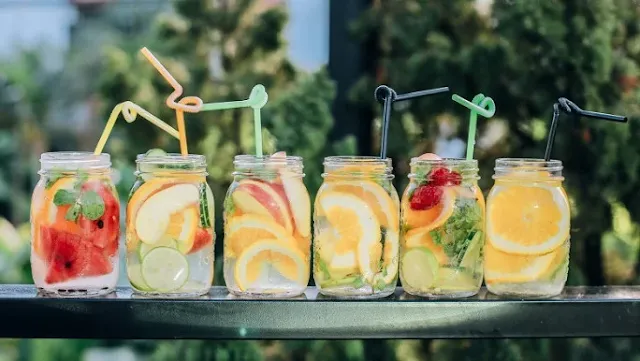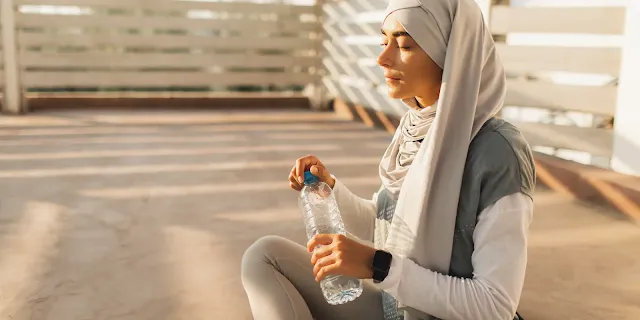Introduction:
Ramadan Expert Tips and Special Drink Recipes as the holy month of Ramadan approaches, millions of Muslims around the world are preparing to embark on a journey of self-reflection, spiritual growth, and communal solidarity. Ramadan is not only a time for fasting from dawn till sunset; it is also an opportunity for believers to deepen their connection with their faith, engage in acts of altruism, and build ties with loved ones.
Comprehending Dehydration During Fasting:
Ramadan fasting is a special difficulty because the body is deprived of food and liquids for prolonged periods of time. The state known as dehydration occurs when the body loses more fluid than it is able to absorb. It can cause a variety of negative symptoms, including headaches, exhaustion, lightheadedness, and trouble focusing. The essence of Ramadan may be diminished by these symptoms, which might impair one's physical well-being and ability to focus spiritually.

Hydration's Health Benefits:
Especially during Ramadan, maintaining proper hydration is crucial for general health and well-being. Vital biological processes such as lubricating joints, controlling body temperature, promoting digestion, and eliminating toxins are all supported by enough hydration. In addition, sufficient hydration encourages glowing skin and maintains vitality, allowing people to participate completely in prayer and introspection throughout the fasting phase.
Maintaining Energy Levels Through Hydration:
Sustaining energy levels throughout the day depends on maintaining proper hydration, which also helps people stay focused and energetic during fasting hours. The body cannot function at its best when it is dehydrated, which leads to weariness and impaired cognitive performance. Fasting people can improve their physical and mental resilience and have a more fulfilling Ramadan by emphasizing their water.
Expert Tips for Staying Hydrated:
Strategic actions are essential to supporting hydration during Ramadan. The following professional advice can assist those who are fasting in staying as hydrated as possible:
Plan Your Water Consumption:
During the hours you are not fasting, try to drink as much water as possible. Try to have at least eight glasses between Iftar and Suhoor. This calculated strategy makes sure that there is enough water in the body before the fast of the day commences, which lays a solid basis for long-term health.
Accept Hydrating Foods:
Make sure to include foods high in water, like fruits and vegetables, in your Suhoor and Iftar meals. Cucumbers, oranges, tomatoes, watermelon, and cucumbers are a few examples of foods that provide vital nutrients and fluids while also enhancing general health and fasting diets.
Limit Your Intake of Sugary Drinks and Caffeine:
These two substances might worsen dehydration, so cut back on them. To satisfy your thirst without dehydrating yourself more, choose hydrating options like water, herbal teas, and pure fruit juices.
Special Drink Recipes for Refreshment:
Here are some delicious drink ideas perfect for Ramadan to boost hydration and liven up the fast:
Refreshing Mint Lemonade:
This refreshing drink awakens the senses by combining freshly squeezed lemon juice, mint leaves, water, and a small amount of honey.
Nutrient-Packed Date Smoothie:
Process dates, almonds, low-fat milk, and a pinch of cinnamon to make a smooth, nourishing smoothie that gives you long-lasting energy and hydration.

Conclusion:
To put it simply, staying hydrated is crucial to maintaining physical energy, mental clarity, and spiritual focus during Ramadan. Fasting people can create a fulfilling Ramadan experience that includes both physical and spiritual well-being by realizing the value of staying hydrated, implementing professional advice, and adopting cool drink concoctions. I pray that you will be hydrated, energetic, and spiritually inspired during the holy month of Ramadan as you begin your fast.
FAQs:
What are some hydrating recipes for Ramadan?
Recipes for hydrating drinks during Ramadan include milkshakes, banana oatmeal smoothies, pink lemonade, and badam ka shishbat. These recipes are a great way to stay hydrated and get nutrients while also satisfying your thirst.
How can I maintain energy levels during Ramadan?
During Suhoor and Iftar, it's important to eat balanced meals, drink plenty of water, and include items high in energy to sustain your energy levels throughout Ramadan. Steer clear of high sugar and caffeine intake since these can cause energy dumps.
Are there specific foods that can help with hydration during Ramadan?
It's true that during Ramadan, meals high in water content, like watermelon, cucumbers, oranges, and tomatoes, can aid in staying hydrated. To increase your hydration consumption, you can include these foods in your Suhoor and Iftar meals.
What are effective strategies for staying hydrated during Ramadan?
Good tips for remaining hydrated throughout Ramadan include drinking enough water during the hours when you aren't fasting, including foods that are high in water in your meals, limiting your intake of coffee and sugary drinks, and taking a thoughtful and balanced approach to being hydrated.




.jpg)


0 Comments